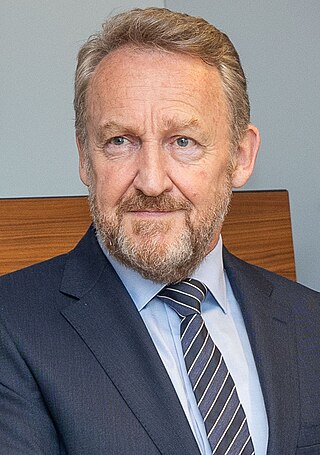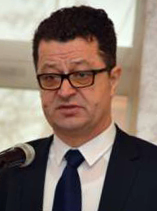The Politics of Bosnia and Herzegovina takes place in a framework of a parliamentary representative democracy, whereby executive power is exercised by the Council of Ministers of Bosnia and Herzegovina. Legislative power is vested in both the Council of Ministers and the Parliamentary Assembly of Bosnia and Herzegovina. Members of the Parliamentary Assembly are chosen according to a proportional representation system.

The Federation of Bosnia and Herzegovina is one of the two entities within the State of Bosnia and Herzegovina, the other being Republika Srpska. The Federation of Bosnia and Herzegovina consists of ten autonomous cantons with their own governments and legislatures.

Dragan Čović is a Bosnian Croat politician who served as the 4th Croat member of the Presidency of Bosnia and Herzegovina from 2002 to 2005 and from 2014 to 2018. He is the current president of the Croatian Democratic Union and is a member of the national House of Peoples.

The Alliance of Independent Social Democrats is a Serb political party in Bosnia and Herzegovina. Founded in 1996, it is the governing party in Republika Srpska, with its leader, Milorad Dodik, serving as the current president of Republika Srpska. The party's vice-president, Željka Cvijanović, is the current member of the Presidency of Bosnia and Herzegovina, while SNSD member Radovan Višković is the current prime minister of Republika Srpska.

The Parliamentary Assembly of Bosnia and Herzegovina is the bicameral legislative body of Bosnia and Herzegovina. It consists of the following two chambers.

General elections were held in Bosnia and Herzegovina on 1 October 2006. They decided the makeup of Bosnia and Herzegovina's Presidency as well as national, entity, and cantonal governments.

The Croats of Bosnia and Herzegovina, often referred to as Bosnian Croats or Herzegovinian Croats, are the third most populous ethnic group in the country after Bosniaks and Serbs, and are one of the constitutive nation of Bosnia and Herzegovina. Croats of Bosnia and Herzegovina have made significant contributions to the culture of Bosnia and Herzegovina. Most Croats declare themselves Catholics and speakers of the Croatian language.
General elections were held in Bosnia and Herzegovina on 5 October 2002. Voter turnout was 55%.

Bakir Izetbegović is a Bosnian politician who served as the 6th Bosniak member of the Presidency of Bosnia and Herzegovina from 2010 to 2018. He is the current president of the Party of Democratic Action.

General elections were held in Bosnia and Herzegovina on 3 October 2010. They decided the makeup of Bosnia and Herzegovina's Presidency as well as national, entity, and cantonal governments.
Following the general election on 3 October 2010, a process of formation of Bosnia and Herzegovina's Council of Ministers had begun. The resulting election produced a fragmented political landscape without a coalition of a parliamentary majority more than a year after the election. The centre-left Social Democratic Party, the largest party in the Federation of Bosnia and Herzegovina, and the Bosnian Serb autonomist Alliance of Independent Social Democrats, the largest party in Republika Srpska, each had 8 MPs of the total 42 MPs of the House of Representatives. Similarly, a crisis of government was also present at the local levels, as well as the Federal entity.

Parliament of the Federation of Bosnia and Herzegovina is the bicameral legislature of the Federation of Bosnia and Herzegovina (FBiH).
The Government of the Federation of Bosnia and Herzegovina, commonly abbreviated to the Federal Government, is the main executive branch of government in the Federation of Bosnia and Herzegovina, one of the two entities of Bosnia and Herzegovina. It is headed by the prime minister. The Federal president, in agreement with both vice-presidents of the Federation, appoints the Federal Government, upon consultation with a prime minister or a nominee for that office. The Government is elected after its appointment has been confirmed by a majority vote in the Federal House of Representatives.
The House of Peoples of the Federation of Bosnia and Herzegovina is an upper house of the Parliament of the Federation of Bosnia and Herzegovina, the lower being the House of Representatives. Federal laws need to be passed by both houses.
The Croatian National Assembly is a political organisation of Croat political parties in Bosnia and Herzegovina. The organisation serves as a platform to coordinate political and cultural activities of different parties and stakeholders in the Croatian community and to promote the initiative to create a federal unit with Croatian majority in the country.

Martin Raguž is a Bosnian Croat politician who served as the Chairman of the Council of Ministers of Bosnia and Herzegovina from 18 October 2000 until 21 February 2001. He was a member of both the national House of Representatives and House of Peoples.

Senad Šepić is a Bosnian politician who is the current president of the Independent Bloc and has been serving as a member of the national House of Representatives since 12 January 2012. He was a member of the Party of Democratic Action (SDA) until 2017. Šepić was a prominent critic of party leader Bakir Izetbegović.

The Croat federal unit in Bosnia and Herzegovina, or Croat entity, also informally known as the third entity, is a proposed administrative unit in Bosnia and Herzegovina based on territorial federalism and ethnic self-determination. The proposal has been invoked by several political scientists, politicians and political parties, including the Croat National Assembly. So far it has not been discussed beyond the concept level. Since the country is divided into two entities, the Serb-dominated Republika Srpska and the Bosniak-majority Federation, Croats, as one of the three equal constitutive nations, have proposed creating a symmetrical Croat-majority territorial unit. Political advocates for such proposal argue it would ensure Croat equality and prevent electoral gerrymandering, simplify the political gridlock while dismantle overburdening administration. Opponents argue it would further divide the country on ethnic grounds thus breaching the constitutional principles, put non-Croats in a subordinate position, and lead to separatism.

General elections were held in Bosnia and Herzegovina on 7 October 2018. They decided the makeup of Bosnia and Herzegovina's Presidency as well as national, entity, and cantonal governments. Voter turnout was 54%.

General elections were held in Bosnia and Herzegovina on 2 October 2022. They decided the makeup of Bosnia and Herzegovina's Presidency as well as national, entity, and cantonal governments.















